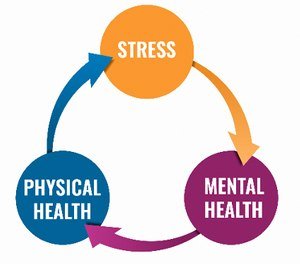Did you know that we have a ‘second brain’? No, this isn’t a brain that helps us to make decisions about what we might want to post on social media, make financial decisions or even where we might like to go out for the day. This second brain is linked to controlling our digestive system. But, it’s also so much more than this. It can affect our emotions. Yes, you heard that right, our gut health is linked to our anxiety.
You’ve probably made decisions based on your ‘gut instinct’ or had butterflies in your stomach when you’re nervous. This is likely because you’re getting signals from your second brain. Hidden in the walls of the digestive system, this “brain in your gut” is revolutionizing medicine’s understanding of the links between digestion, mood, health and even the way you think.
Scientists call this little brain the enteric nervous system (ENS). And it’s not so little. The ENS is two thin layers of more than 100 million nerve cells lining your gastrointestinal tract.
Because the enteric nervous system relies on the same type of neurons and neurotransmitters that are found in the central nervous system, some medical experts call it our “second brain.” The “second brain” in our gut, in communication with the brain in our head, plays a key role in certain diseases in our bodies and in our overall mental health.
The ENS can trigger large emotional shifts experienced by people coping with such issues as IBS, constipation, diarrhoea, bloating, pain and stomach-ache. For many years, researchers have understood symptoms such as anxiety and depression to cause these physical symptoms. However, more recent research is also showing that it could also be the other way round. There is more evidence coming to light that irritation in the gastrointestinal system may send signals to the central nervous system (CNS) that trigger mood changes.
These new findings might explain why there is a higher level of anxiety and depression in those who are also experiencing poor gut health such as IBS and other associated bowel problems. This is a really important finding as up to 40% percent of the population has bowel problems at some point. Our gut is not solely responsible for feeling anxious, stressed or depressed. But this new evidence certainly shows that there is a link between our physical and emotional health. Maybe if we improve our digestive health, our emotional health can be improved too. Improving our gut health can improve our anxiety.
This new understanding of the ENS-CNS connection helps explain the effectiveness of IBS and bowel-disorder treatments such as antidepressants and mind-body therapies like cognitive behavioural therapy (CBT) and anxiety management. Our two brains ‘communicate’ with each other, so therapies that help one may help the other.
What are some examples of how the network of neurons in our gut and brain communicate with each other?
I’m betting you’ve heard of the fight or flight response. This is when the central nervous system is triggered in response to an actual or perceived threat. When this happens, the enteric nervous system responds by slowing down or even stopping digestion. This happens so that more of the body’s energy can be used to react to the danger or perceived threat.
A common example of this is public speaking. The fear of this can cause the digestive system to either slow down or increase depending on the GI disorder. It can cause abdominal pain or even diarrhoea and you get the familiar feeling of your ‘stomach churning’.
Emotions, feelings of excitement, or nervousness can cause the familiar churning in the stomach – the so-called “butterflies in your stomach” feeling. The gut-brain connection works in both directions too. For example, GI problems can create anxiety and stress.
It’s not just that a stomach-ache can sour your day. It’s more than that. The enteric nervous system is a mesh-like network of neurons that lines the entire digestive tract. It causes the sensation of nervous butterflies or a pit in your stomach that are innate parts of our psychological stress and anxiety responses. Up to 90 percent of the cells involved in these responses carry information to the brain rather than receiving messages from it, making your gut as influential to your mood as your head is. Maybe even more.
So why is this good news?
It’s good news because with a two-fold approach you can reduce your stress, manage your anxieties and live a happier and healthier life.
So how can a stress and anxiety coach help you cope with your Gastrointestinal (GI) problems.
The conditions of anxiety and stress provide a simple example. Anxiety and stress are psychological concerns. We know that gastrointestinal (GI) problems can create anxiety and stress. We also know that anxiety and stress can make GI problems worse. It’s been shown that psychological treatment techniques can help ease GI distress or at least help a person cope with their GI symptoms.
Studies indicate that those with healthy and diverse gut microbes are less likely to suffer from either anxiety or depression. And many of us who grew up in too-clean environments, frequently took antibiotics, and ate junk food have a decidedly unhealthy microbiome. So changing one’s diet could well benefit far more than your waistline.
You may have come across the terms, pre and probiotic. The latter is often seen in foods like drinks or yogurts. Simply put, probiotics are foods that contain healthy bacteria. Prebiotics are the ‘compost’ that helps to grow and nurture the healthy bacteria. Rather like in gardening. You plant your seeds (the probiotic bacteria) and the compost (pre biotics) help to grow and nurture the seed (good bacteria) Together, prebiotic and probiotic food help keep your second brain full of the vibrant bacterial community it needs to function. Gut health and Anxiety can be controlled.
Combine this change in diet with a therapeutic approach such as Anxiety Coaching that works to change your mindset, this is a really powerful combination. Not only are you working on your anxious thoughts you are nurturing your second brain too. Just think of the amazing changes you can make to your life with this combined approach.
If you really want to make the changes in your life that you deserve, and live a happier, healthier, and more confident life, reach out to me to find out how.






